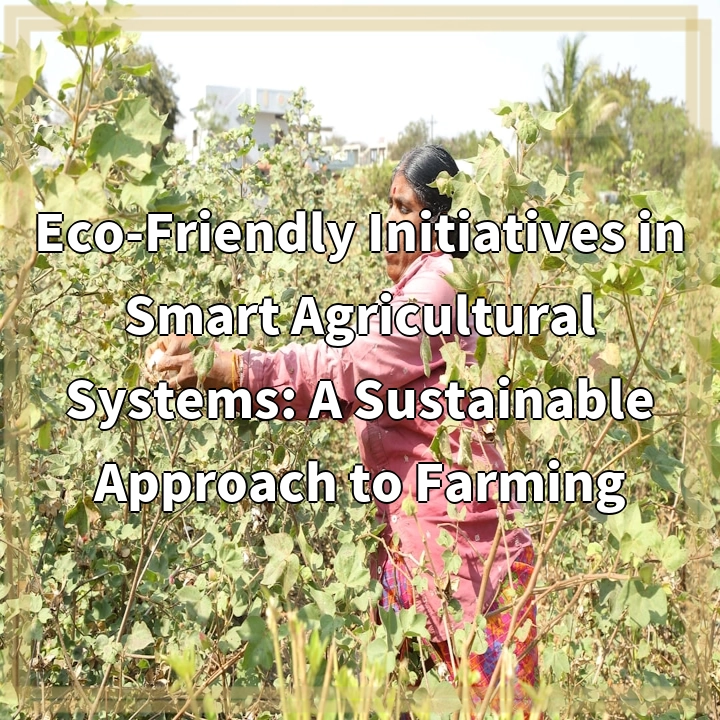
What is Eco-Friendly Initiatives in Smart Agricultural Systems?
Smart agricultural systems refer to the integration of advanced technologies and sustainable practices in farming to optimize resource efficiency, minimize environmental impact, and ensure long-term sustainability. Eco-friendly initiatives within these systems are designed to reduce reliance on harmful chemicals, promote biodiversity, conserve water, and mitigate climate change effects. These initiatives encompass a range of sustainable farming practices such as organic agriculture, precision farming, agroforestry, and integrated pest management.
Real-World Problems Associated with Eco-Friendly Initiatives in Smart Agricultural Systems
1. Transition Challenges
Adopting eco-friendly initiatives in smart agricultural systems can pose significant challenges for farmers. The transition from conventional farming methods to sustainable practices often requires substantial investments in new technologies, equipment, and training. Additionally, there may be a learning curve involved in implementing these initiatives effectively. Lack of financial resources and technical knowledge can hinder the widespread adoption of sustainable farming practices.
2. Limited Access to Technology
In certain regions or developing countries, farmers may have limited access to advanced technologies necessary for smart agricultural systems. High costs, lack of access to reliable electricity and internet connectivity, and limited availability of technical support can impede the implementation and benefits of eco-friendly initiatives. Bridging the digital divide and ensuring equitable access to technology is crucial for the success of sustainable farming practices.
3. Market Demand and Consumer Awareness
The success of eco-friendly initiatives in smart agricultural systems relies heavily on market demand and consumer awareness. If there is insufficient demand for sustainably produced goods or a lack of awareness about the environmental and health benefits, farmers may be discouraged from adopting these practices. Education and outreach programs are needed to increase consumer awareness and create a market that values and supports sustainable farming.
4. Policy and Regulatory Frameworks
The absence of supportive policy and regulatory frameworks can hinder the widespread implementation of eco-friendly initiatives. Governments play a crucial role in providing incentives, financial assistance, and supportive policies that encourage farmers to adopt sustainable practices. Without proper regulations and support, the transition to smart agricultural systems may not be feasible or economically viable for farmers.
5. Climate Change and Resource Scarcity
Climate change and resource scarcity pose significant challenges to eco-friendly initiatives in smart agricultural systems. Climate variability and extreme weather events can undermine the effectiveness of sustainable practices. Water scarcity, soil degradation, and the loss of biodiversity can also impact farming productivity. Addressing these challenges requires implementing adaptive measures and resilient practices that can withstand the changing climate and ensure long-term sustainability.

Solutions to the Challenges
1. Support and Education for Transition
To overcome the challenges of transitioning to eco-friendly initiatives, financial and technical support should be provided to farmers. Government agencies, non-profit organizations, and agricultural extension services can offer financial incentives, grants, and low-interest loans to facilitate the adoption of sustainable practices. Additionally, training programs and workshops should be organized to educate farmers about the benefits and implementation techniques of smart agricultural systems.
2. Improving Access to Technology
Efforts should be made to improve access to technology in areas where it is limited. Governments and organizations can invest in the development of affordable and user-friendly tools specifically designed for resource-constrained regions. Mobile applications and offline functionality can help farmers access information and guidance without the need for consistent internet connectivity. Partnerships with technology companies can also aid in expanding access to cutting-edge tools and equipment.
3. Creating Consumer Demand and Awareness
Creating consumer demand for sustainably produced goods is vital for the success of eco-friendly initiatives. Educating consumers about the environmental and health benefits of sustainable agriculture through marketing campaigns, labeling initiatives, and collaboration with consumer organizations can increase awareness and preference for eco-friendly products. Governments can also play a role by implementing policies that promote the consumption of sustainable food and providing support for certification schemes.
4. Enabling Policy and Regulatory Frameworks
Governments should establish supportive policy and regulatory frameworks that incentivize farmers to adopt eco-friendly initiatives. This can include financial incentives, tax breaks, and subsidies for sustainable farming practices. Additionally, regulations should be put in place to ensure the protection and conservation of natural resources, promote organic farming, and discourage the use of harmful pesticides and chemicals. Collaborative efforts between government, farmers, and environmental organizations can help shape effective policies.
5. Building Resilient and Adaptive Systems
To address the challenges posed by climate change and resource scarcity, it is crucial to implement resilient and adaptive agricultural systems. This involves the use of climate-smart techniques such as water-efficient irrigation methods, soil conservation practices, crop diversification, and agroforestry. Supporting research and development in climate-resilient crop varieties and providing farmers with climate information services can help them make informed decisions and adapt to changing conditions.















